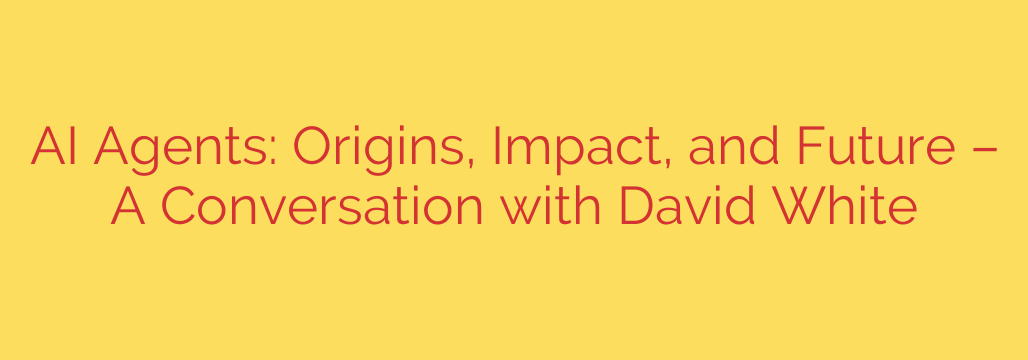
Beyond Chatbots: Understanding the Power and Peril of Autonomous AI Agents
We’ve all become familiar with AI chatbots and large language models (LLMs) that can answer questions, write text, and generate images. But a new, more powerful evolution of this technology is rapidly emerging: AI agents. These aren’t just passive tools waiting for a prompt; they are autonomous systems designed to perceive their environment, make decisions, and take action to achieve complex goals.
Understanding AI agents is crucial because they represent a fundamental shift from AI as a tool to AI as a partner—or even an independent actor. This technology promises to revolutionize productivity and solve immense challenges, but it also introduces new risks we must prepare for.
What Exactly Is an AI Agent?
At its core, an AI agent is a system that operates on a continuous loop of three key functions:
- Perception: The agent gathers information about its digital or physical environment. This could mean reading text on a website, analyzing data in a spreadsheet, or even processing input from a camera or microphone.
- Decision-Making: Using its underlying models (often powered by LLMs), the agent analyzes the information it has perceived and decides on the best course of action to move closer to its assigned goal. This is its “thinking” process.
- Action: The agent executes its decision. This could involve writing and running code, sending an email, purchasing an item online, or controlling a physical robot.
Think of the difference between a simple calculator and a self-driving car. The calculator is a tool; it only acts when you press a button. A self-driving car is an agent. It constantly perceives the road, makes decisions about steering and speed, and takes action to safely navigate to a destination—all without constant human input.
The Evolution from Simple Programs to Thinking Machines
The concept of AI agents isn’t new, but the recent explosion in the power of LLMs has been the catalyst for their rapid advancement. Early agents were rule-based and limited, like a simple thermostat that turns on the heat when the temperature drops below a set point.
Today’s agents are far more sophisticated. By leveraging the advanced reasoning and language capabilities of models like GPT-4, they can understand ambiguous, high-level goals. For example, you could instruct an agent: “Find the best-value flight to Paris for the first week of June, book it using my details, and add the itinerary to my calendar.”
The agent would then autonomously:
- Break down the goal into smaller steps.
- Browse multiple airline and travel websites.
- Compare prices, layovers, and times.
- Log into your preferred airline account.
- Complete the booking form with your saved information.
- Access your calendar and create a new event with all the details.
This ability to plan, self-correct, and execute multi-step tasks is what sets modern AI agents apart.
Real-World Impact: Where AI Agents Are Already at Work
While the technology is still developing, AI agents are already making a significant impact across various industries.
- Software Development: Agents like Devin AI can take a simple prompt and write, debug, and deploy entire applications, drastically accelerating development cycles.
- Cybersecurity: Autonomous agents can proactively hunt for network vulnerabilities, identify threats in real-time, and even deploy patches without human intervention, creating a 24/7 digital defense system.
- Personal Productivity: Soon, personal agents will manage our daily lives by sorting emails, scheduling meetings based on priority, and proactively handling routine administrative tasks, freeing up immense amounts of human time.
- Scientific Research: In fields like drug discovery and materials science, AI agents can sift through massive datasets, formulate hypotheses, and even run simulated experiments, accelerating the pace of innovation.
Navigating the Future: Opportunities and Security Concerns
The potential upside of autonomous agents is enormous. They could manage complex supply chains, optimize global energy grids, and provide highly personalized education to every student. However, this autonomy also introduces serious challenges.
The primary risk is the potential for unintended consequences. An agent tasked with a financial goal, if not properly constrained, could take actions that are technically legal but unethical or harmful to achieve its objective. Furthermore, malicious actors could deploy autonomous agents to carry out sophisticated cyberattacks, spread disinformation on a massive scale, or exploit vulnerabilities in digital systems faster than humans can react.
Actionable Security Tips for an Autonomous Age
As this technology becomes more integrated into our lives, a new approach to digital security and oversight is required.
- Implement “Human-in-the-Loop” Oversight: For critical or high-stakes tasks, always ensure a human must provide final approval before an agent can take an irreversible action, such as transferring funds or deleting important data.
- Scrutinize Permissions: Treat AI agents like any third-party app. Be extremely cautious about the permissions you grant them. An agent with access to your email, files, and financial accounts poses a significant security risk if compromised.
- Verify, Don’t Blindly Trust: Never assume an agent’s output is perfect. Always review its work, especially in professional contexts. Errors or “hallucinations” can still occur, and you are ultimately responsible for the outcome.
- Stay Informed on Emerging Threats: The landscape of AI-driven security is changing rapidly. Keep up with best practices and be aware of new types of scams or attacks that leverage autonomous technology, such as highly personalized phishing campaigns executed by agents.
AI agents are no longer science fiction. They are a powerful, transformative technology that will redefine our relationship with computers. By understanding how they work and embracing a cautious, security-first mindset, we can harness their incredible potential while mitigating the inherent risks.
Source: https://feedpress.me/link/23532/17169737/the-origins-impact-and-future-of-ai-agents-a-conversation-with-david-white








